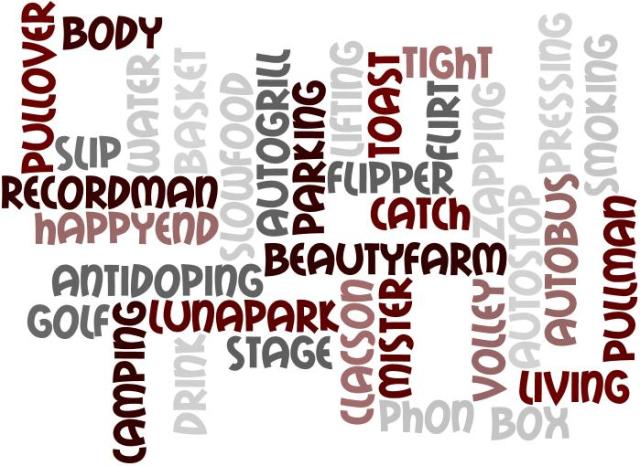 We Italians, as you certainly know, are creative people. What you may not know is that our creativity goes so far as to invent new words in other languages.
We Italians, as you certainly know, are creative people. What you may not know is that our creativity goes so far as to invent new words in other languages.
Believe it or not, the following sentence makes perfect sense in Italian:
«Ieri mattina ho fatto footing, poi ho preso il pullman, portando con me un pullover. Ci siamo fermati ad un autogrill, ho mangiato un toast, ho fatto una partita a flipper, e quando l’autista ha suonato il clacson, siamo risaliti sull’autobus e ripartiti. Se mi avesse lasciato lì, sarei tornato a casa in autostop. La sera sono stato al luna park e ho preso un drink con un amico. Poi sono tornato a casa, ho messo la macchina nel box, mi sono fatto una doccia e ho asciugato i capelli col phon, mi sono seduto davanti al televisore e ho fatto zapping».
Although this mini story seems to be peppered with English words, it is very likely that an English speaker will have a hard time understanding it. The words in boldface above are indeed called false anglicisms, that is English-like words, in terms of spelling and phonetics, but not belonging at all to the English language (at least, not with that meaning).
What we Italians (and we Italians only) call footing is actually jogging; a smoking is a tuxedo; a montgomery is a duffel coat. Be warned: if you go into a bar and ask for scotch, expect that the bartender will offer you transparent adhesive tape. The term scotch, indeed, hardly means whisky in Italian.
Words such as pullman (bus) and golf (sweater) have even their own diminutive: pulmino (little bus) and golfino (small sweater).
False anglicisms are a strange phenomenon but I believe something similar happens to other languages too (ask, in Italy, a latte and you’ll get a pearly-white glass of milk; the name used in Italy is caffellatte/caffelatte, or latte macchiato).
Sometimes English words enter surreptitiously in Italian, shedding their Anglo-Saxon skin, and mingling in the crowd. It’s the case of bovindo, a terrible Italianization of bow-window; or water (toilet), pronounced as if it were written vater (v uttered as the German w, a “voiced labiodental fricative”).
Please let me know if you find any false italianism in your language 😉

Non sono riuscita ad escogitare nessun “false italianism,” però volevo condividere il mio “false anglicism” preferito in assoluto: “relax.” A me piace il modo in cui la parola “relax” è usata come un sostantivo in italiano: “Ho proprio bisogno di un po’ di relax.” “Relax” non è mai utilizzata così in inglese; diciamo invece “relaxation.”
Grazie per avermi ricordato questo false anglicism! Ce ne sono talmente tanti, nella lingua italiana, e siamo talmente abituati a sentirli, che ci sorvoliamo sopra facilmente! Come supponevo, gli pseudo-anglicism sono presenti in tutte le lingue: http://en.wikipedia.org/wiki/Pseudo-anglicism
Seems I have two languages to learn!
Not to mention all the Italian dialects! 😀
Non voglio ne pensare. (Corrections to my Italian welcome)
“Non ci voglio pensare” 🙂
Grazie!
I hope you don’t mind a couple of observations: pullover is a commonly used word in English, if you’re referring to un maglione; scotch is not synonimous with whiskey (which is Irish) but with whisky (Scottish); clacson would be understood (we spell it klaxon) but is normally reserved for those warning devices used by emergency service vehicles; and finally, I don’t think your example of ‘drink’ as a false anglicism is valid, it’s a widely used term, e.g. to go for a drink with someone, although it is always assumed to be an alcoholic drink.
Nice to see you writing once again.
Hello Calum, nice to read a message from you. I think, in general, that false anglicisms may have an ephemeral existence because cultures influence each other, words pass from a language to another, and what looks like a false anglicism today, might not be in future. Thanks for clarifying. I didn’t know that “pullover” is an acceptable synonym for sweater; I discovered it is either in American or British English. I noticed that French, Germans and Italians tend to use it more frequently than “sweater”, so I guessed it entered the English language from the “outside”. We use “clacson” to refer to any vehicle horn. The word “drink” doesn’t necessarily imply an alcoholic beverage, in Italian, although I must say that the sentence “ci facciamo un drink” would usually refer to something more sophisticated than an Orangina 😉